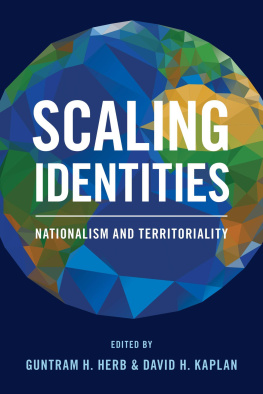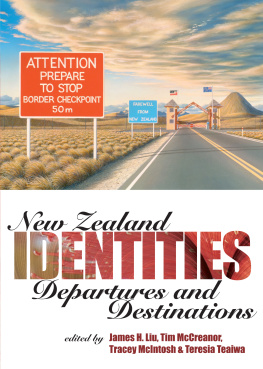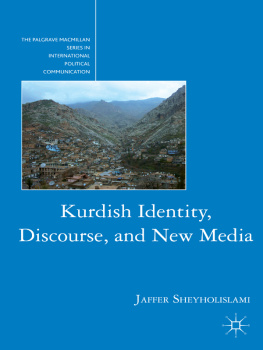Scaling Identities
Scaling Identities
Nationalism and Territoriality
Edited by Guntram H. Herb and David H. Kaplan
Rowman & Littlefield
Lanham Boulder New York London
Published by Rowman & Littlefield
A wholly owned subsidiary of The Rowman & Littlefield Publishing Group, Inc.
4501 Forbes Boulevard, Suite 200, Lanham, Maryland 20706
www.rowman.com
Unit A, Whitacre Mews, 26-34 Stannary Street, London SE11 4AB, United Kingdom
Copyright 2018 by Rowman & Littlefield
All rights reserved. No part of this book may be reproduced in any form or by any electronic or mechanical means, including information storage and retrieval systems, without written permission from the publisher, except by a reviewer who may quote passages in a review.
British Library Cataloguing in Publication Information Available
Library of Congress Cataloging-in-Publication Data Available
ISBN 978-1-4422-6475-5 (cloth : alk. paper)
ISBN 978-1-4422-6476-2 (pbk. : alk. paper)
ISBN 978-1-4422-6477-9 (electronic)
The paper used in this publication meets the minimum requirements of American National Standard for Information SciencesPermanence of Paper for Printed Library Materials, ANSI/NISO Z39.48-1992.
Printed in the United States of America
To Martin and Gertrud Herb, who are traveling without a map.
In memory of Bernard and Jane Kaplan, who indulged mypassion for geography.
Contents
Introduction: Scaling the Nation
David H. Kaplan and Guntram H. Herb
There is no way to think about a nation without thinking about territory and scale. National identity is often held midway between the localized identities of a town or village and the globalizing forces that bring in the entire world. National identity creates a phantasm of belonging to an entity that creates a sense of kinship, camaraderie, and familiaritydespite including millions upon millions of strangers. In recent years, studies of national identity and public discourse have looked into questions of scale but have mostly left this as an unexamined concept. Yet because territory and scale are all too often conceptualized as fixed, static, and hierarchical, the scale of a nation is taken for granted, situated between the local and the global.
Recent scholarship has exposed this view as limiting and even misleading because both territory and scale are fluid, dynamic and intertwined with national identity in complex ways (Storey 2012). Take the example of the Russian annexation of Crimea, which is generally considered a prime expression of Russian nationalism or of Russias global geopolitical ambitions. However, neither one of these distinct scalar views captures the event. Russias action should be viewed as a process that combines the dissatisfaction of Russian residents in Crimea, the desire for Russian forward bases at the local level, irredentism and the quest to unite all Russians in a homeland, and Russian global power aspirations. Here, neither identity nor power at local, national, and global scales can be separated, but instead form a complex web of interactions.
When we published Nested Identities eighteen years ago, we were cognizant of the importance of scale and territory in defining national identities (Herb and Kaplan 1999). In that book, we tried to expose the mutability of scale and the interaction of identities at separate scales. What was missing, however, was the notion that the scale of a particular nation itself was subject to ongoing changes. The identities we described were presented more or less at fixed scales, when in fact scale is a dynamic process. In this new book, Scaling Identities , we focus on scalar processes. We identify four processes. Consolidating identities considers the strategies necessary to keep all parts within the fold. This is a more traditional national identity consolidation via state power: educational systems, minority policy, immigration, and such. In other words, the focus is top down but includes centrifugal processes and resistances. Magnifying identities looks at the consequences of shifting the scale up and unifying territories that have a sense of a larger, supranational identity. Connecting identities examines physically separated territories and considers the influence of physical distance and separation across water or through sovereign boundaries. It pays attention to vastly different place contexts and the need for strategies to overcome distance and separation. Fragmenting identities looks into the disintegration of national identities. These are processes that have the potential to unravel a nation or block its effective formation.
This volume combines theoretical insights with several structured case studies to understand how national identity is negotiated across spatial scales. Nationalism and national identity continue as important flashpoints in our geopolitical order. We have seen events take shape such as the development of a quasi-independent Kurdistan in northern Iraq, the decision of Britain to exit the European Union, and the Chinese crackdown on its minority regions. In the scholarly literature, there has been an explosion of interest in territoriality, transnationalism, diasporas, and critical geopoliticsall of which have significant ramifications for the study of national identity.
Like its predecessor, Scaling Identities addresses the significance of geography and scale to national identities. Contributions by experts on territory and national identity are organized in a coherent framework and placed in a sound theoretical context. Beyond our shift in thinking about scale as a process, Scaling Identities offers a set of case studies much broader than the more Eurocentric focus of its predecessor. Chapters on cases outside of Europe now constitute nine out of the twelve case studies. We have added cases from South America, the Arab world, East Asia, and indigenous peoples.
In creating a coherent and well-balanced bookin both regional and theoretical orientationwe worked with our authors to consider how scale operates as a process in their individual case studies. We explained the divisions between processes that consolidate, magnify, connect, and fragment, and we provided the authors with a list of questions to consider in formulating each case.
The book is organized by process. The first section, Conceptual Issues, with chapters by Guntram H. Herb and David H. Kaplan, covers the conceptual foundation of this new view of scale. These outline the connections between national identity, territory, and scale and seek to understand how scale operates as a dynamic process. The second section, Consolidating Identities, covers a more traditional approach to nation building but is sensitive to influences from local and regional scales. This includes chapters by Corey Johnson on Germany, David Keeling on Argentina, and Kefa Otiso on Tanzaniathree cases where nationalism was actively constructed. In the third section, Magnifying Identities, chapters by Alexander B. Murphy on Europe, Gary Elbow on the Caribbean, and Karen Culcasi on the Arab Homeland and Palestine look into how supranational identities are constituted through the interaction with identities at lower scales. In the fourth section, Connecting Identities, chapters by Steve Silvern on Native American resurgence, Takashi Yamazaki on island identities in Japan, and Susan Walcott on China look at the challenges of overcoming separation across space and the continual attempts to stitch together a cohesive identity. In the fifth section, Fragmenting Identities, chapters by Carl Dahlman and Sanan Moradi on Kurdistan, George White on Transylvania, and Pablo Bose on the Indian diaspora investigate the forces that undermine the integrity of national identities. In all four regional sections, authors are sensitive to all the scalar processes that we have identified. The afterword by Jouni Hkli offers an in-depth assessment and critique of the most recent post-structural literature on scale and provides an outlook for future theoretical directions.
Next page










